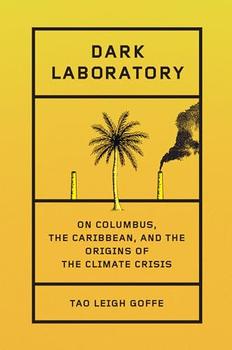Summary | Excerpt | Reviews | Beyond the book | Read-Alikes | Genres & Themes | Author Bio

On Columbus, the Caribbean, and the Origins of the Climate Crisis
by Tao Leigh GoffeA groundbreaking investigation of the Caribbean as both an idyll in the American imagination and a dark laboratory of Western experimentation, revealing secrets to racial and environmental progress that impact how we live today.
In 1492, Christopher Columbus arrived on the Caribbean Island of Guanahaní to find an Edenic scene that was soon mythologized. But behind the myth of paradise, the Caribbean and its people would come to pay the price of relentless Western exploitation and abuse. In Dark Laboratory, Dr. Tao Leigh Goffe embarks on a historical journey to chart the forces that have shaped these islands: the legacy of slavery, indentured labor, and the forced toil of Chinese and enslaved Black people who mined the islands' bounty—including guano, which, at the time, was more valuable than gold—for the benefit of European powers and at the expense of the islands' sacred ecologies.
Braiding together family history, cultural reportage, and social studies, Goffe radically transforms how we conceive of Blackness, the natural world, colonialism, and the climate crisis; and, in doing so, she deftly dismantles the many layers of entrenched imperialist thinking that shroud our established understanding of the human and environmental conditions to reveal the cause and effect of a global catastrophe. Dark Laboratory forces a reckoning with the received forms of knowledge that have led us astray.
Through the lens of the Caribbean, both guide and warning of the man-made disasters that continue to plague our world, Goffe closely situates the origins of racism and climate catastrophe within a colonial context. And in redressing these twin apocalypses, Dark Laboratory becomes a record of the violence that continues to shape the Caribbean today. But it is also a declaration of hope, offering solutions toward a better future based on knowledge gleaned from island ecosystems, and an impassioned, urgent testament to the human capacity for change and renewal.
Goffe's scope is wide-ranging and dotted with her personal history; she understands the world she inhabits through discovery and exploration of her ancestral connections, examining how her mixed heritage is inflected with the aftereffects of colonialism. In doing so she makes a too often intellectualized problem — how to solve climate change — deeply intimate. By tracing history in this way, she deftly folds together intertwined historical threads to make visible ecological destructions, racialized violence, and even the multiple apocalyptic events survived by Black and Indigenous peoples across the globe at the hands of Western colonization. But despite the darkness she still sees opportunities for change. Goffe invites readers to recognize that the current ecological conditions are the result of a lack of imagination, not the inevitable path of history running its course...continued
Full Review
 (620 words)
(620 words)
(Reviewed by Michelle Anya Anjirbag).
Dark Laboratory is an incredible reconfiguring of a historical moment that provides a new understanding of the current climate crisis and how it is intertwined with the legacies of colonialism. One way of thinking about the book is as a countertext to commonly taught histories of globalization, colonialism, and climate change. A countertext is a text or narrative that presents events from a different perspective. They are most frequently studied in literary and sociological contexts, but, as Tao Leigh Goffe proves, they can be equally important when contemplating history and the environment. A countertext can be a work of nonfiction or fiction, but in both cases, it is meant to add to, intervene in, or counteract the narratives that readers...

If you liked Dark Laboratory, try these:

by Jessica J. Lee
Published 2025
A prize-winning memoirist and nature writer turns to the lives of plants entangled in our human world to explore belonging, displacement, identity, and the truths of our shared future

by Zoë Schlanger
Published 2025
Award-winning Atlantic staff writer Zoë Schlanger delivers a groundbreaking work of popular science that probes the hidden world of the plant kingdom and reveals the astonishing capabilities of the green life all around us.